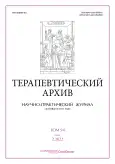COVID-19 as a trigger of autoimmune hepatitis. Case report
- Authors: Volchkova E.A.1,2, Legkova K.S.1, Topchy T.B.2
-
Affiliations:
- City Clinical Hospital №51
- Central State Medical Academy of the President of the Russian Federation
- Issue: Vol 94, No 2 (2022)
- Pages: 259-264
- Section: Case reports
- URL: https://journals.rcsi.science/0040-3660/article/view/105590
- DOI: https://doi.org/10.26442/00403660.2022.02.201374
- ID: 105590
Cite item
Full Text
Abstract
Over the past two years, the entire medical community has taken up the fight against the new coronavirus infection. At the initial encounter with COVID-19, it seemed that this virus mainly affects the respiratory system. Still, with long-term observation, it turned out that the consequences of this disease can be much more severe and associated with lung damage and thromboembolic complications, and be a trigger for autoimmune diseases. According to the literature, after suffering COVID-19, some patients debuted systemic lupus erythematosus, hemolytic anemia, thrombocytopenia, developed Guillain–Barré syndrome, vasculitis, and multiple sclerosis, and a case of autoimmune hepatitis (AIH) was described in foreign literature. AIH is a fairly rare disease, the prevalence of which in Europe is 16–18 cases per 100 thousand inhabitants, affecting mainly women. It is known that chemicals and drugs (minocycline, diclofenac, methyldopa, infliximab, etanercept), viruses (HAV, HEV, EBV, HCV, CMV), environmental factors can serve as triggers of the autoimmune process in the liver. This article presents two clinical cases of AIH that developed after suffering a new coronavirus infection, which we consider as the initial provoking factor of autoimmune inflammation. Given the rarity of AIH, the description of new triggers is of clinical interest. It may be useful for doctors of different specialties since they faced drug-induced liver damage against the background of antiviral and immunobiological therapy. In the domestic literature, there have not yet been any publications devoted to the debut of AIH in adults after coronavirus infection.
Keywords
Full Text
##article.viewOnOriginalSite##About the authors
Ekaterina A. Volchkova
City Clinical Hospital №51; Central State Medical Academy of the President of the Russian Federation
Author for correspondence.
Email: volchkovakaty@mail.ru
ORCID iD: 0000-0003-2530-3553
канд. мед. наук, зав. 1-м терапевтическим отд-нием; доц. каф. терапии, кардиологии и функциональной диагностики с курсом нефрологии
Russian Federation, Moscow; MoscowKristina S. Legkova
City Clinical Hospital №51
Email: volchkovakaty@mail.ru
ORCID iD: 0000-0003-1836-8623
врач-гастроэнтеролог 1-го терапевтического отд-ния
Russian Federation, MoscowTatiana B. Topchy
Central State Medical Academy of the President of the Russian Federation
Email: volchkovakaty@mail.ru
ORCID iD: 0000-0003-4491-881X
канд. мед. наук, доц. каф. гастроэнтерологии
Russian Federation, MoscowReferences
- European Association for the Study of the Liver. EASL Clinical Practice Guidelines: Autoimmune hepatitis. J Hepatol. 2015;63(4):971-1004. doi: 10.1016/j.jhep.2015.06.030
- Czaja AJ, Carpenter HA. Sensitivity, specificity, and predictability of biopsy interpretations in chronic hepatitis. Gastroenterology. 1993;105(6):1824-32. doi: 10.1016/0016-5085(93)91081-r
- Yeoman AD, Westbrook RH, Al-Chalabi T, et al. Diagnostic value and utility of the simplified International Autoimmune Hepatitis Group (IAIHG) criteria in acute and chronic liver disease. Hepatology. 2009;50(2):538-45. doi: 10.1002/hep.23042
- Лопаткина Т.Н. Аутоиммунный гепатит и его вариантные формы: новый взгляд и новые возможности лечения. Пособие для врачей. М.: Форте принт, 2014; с. 18-20 [Lopatkina TN, Autoimmunnyi gepatit i ego variantnye for-my: novyi vzgliad i novye vozmozhnosti lecheniia. Posobie dlia vrachei. Мoscow: Forte print, 2014; p. 18-20 (in Russian)].
- Маев И.В., Андреев Д.Н., Кучерявый Ю.А. Клиническая гепатология: алгоритмы диагностики и лечения. М.: Прима Принт, 2019; с. 31-41 [Maev IV, Andreev DN, Kucheryavyy YuA. Klinicheskaia gepatologiia: algoritmy diagnostiki i lecheniia. Мoscow: Prima Print, 2019; p. 31-41 (in Russian)].
- Singh B, Kaur P, Maroules M. Autoimmune Hepatitis-Primary Biliary Cholangitis Overlap Syndrome Triggered by COVID-19. Eur J Case Rep Intern Med. 2021;8(3):002264. doi: 10.12890/2021_002264
- Miehlke S, Acosta MB, Bouma G, et al. Oral budesonide in gastrointestinal and liver disease: A practical guide for the clinician. J Gastroenterol Hepatol. 2018. doi: 10.1111/jgh.14151
- Cañas CA. The triggering of post-COVID-19 autoimmunity phenomena could be associated with both transient immunosuppression and an inappropriate form of immune reconstitution in susceptible individuals. Med Hypotheses. 2020;145:110345. doi: 10.1016/j.mehy.2020.110345
- Ильченко Л.Ю., Никитин И.Г., Федоров И.Г. COVID-19 и поражение печени. Архивъ внутренней медицины. 2020;10(3):188-97 [Ilchenko LYu, Nikitin IG, Fedorov IG. COVID-19 and Liver Damage. The Russian Archives of Internal Medicine. 2020;10(3):188-97 (in Russian)]. doi: 10.20514/2226-6704-2020-10-3-188-197
Supplementary files







